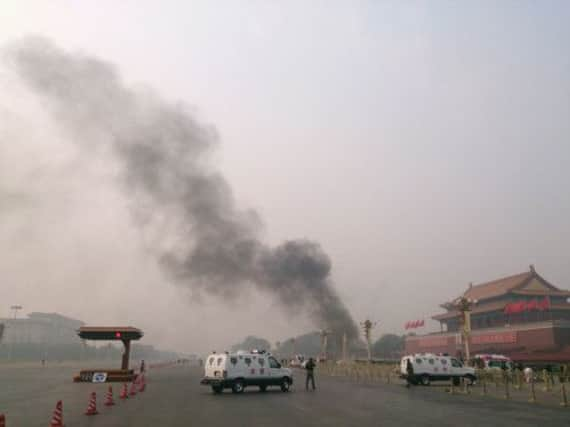Military chief ousted after Tiananmen car attack


The official Xinjiang Daily said in a brief front page report that Peng Yong had been sacked as a member of Xinjiang’s Communist Party standing committee, and would be replaced by Liu Lei, an army veteran with more than a decade’s experience in the region.
The newspaper gave no reason for the move, but the party frequently removes top officials following such incidents as it seeks to apportion blame.
Advertisement
Hide AdAdvertisement
Hide AdThe incident was especially embarrassing for the stability-obsessed party given the billions of dollars it spends every year on domestic security, and that the crash happened in the heart of Beijing.
Mr Peng was appointed commander of the Xinjiang military region in July 2011. It is likely that he will also be relieved of his military duties.
The government has blamed Islamist extremists after a vehicle police said was laden with petrol ploughed into bystanders outside the front entrance of the Forbidden City, on the north side of Tiananmen Square. The three people in the car died, as did two tourists. More than 40 were injured. Police have detained five suspected accomplices.
State media have identified the three people in the car as Usmen Hasan, his mother Kuwanhan Reyim and his wife Gulkiz Gini, all from Hotan in the heavily Uighur southern part of Xinjiang.
On Saturday state media reported that the eight suspected Islamist separatists behind the attack had carried out three reconnaissance trips and collected 400 litres of fuel in preparation for their mission.
State media said that the eight decided to set up a terrorist group in September, and seven of them arrived in Beijing by car on 7 October, while one came by train. On 23 October, five of them returned to Xinjiang’s regional capital Urumqi, while a family of three remained in Beijing.
Security has been stepped up in Beijing and Xinjiang following the incident.
Beijing party chief Guo Jinlong has urged the police to improve their capacity to collect intelligence and take precautions against further attacks, the city government-run Beijing Daily said yesterday.
Advertisement
Hide AdAdvertisement
Hide AdMr Guo urged police and security forces to “look for vulnerable links” and “learn the lessons” from the incident, the report said.
Analysts said the incident had increased tension in the region.
“Since the Tiananmen incident China has increased its local suppression and provocation of Uighurs,” said World Uyghur Congress spokesman Dilxat Raxit. “It could spark a new conflict between Uighurs and China’s government at any time.”
Xinjiang is home to the Muslim Uighur minority, many of whom chafe at China’s restrictions on their religion, culture and language.
Xinjiang has been wracked by unrest in recent years, blamed by the government on the separatist East Turkestan Islamic Movement which Beijing believes was also responsible for last week’s incident.